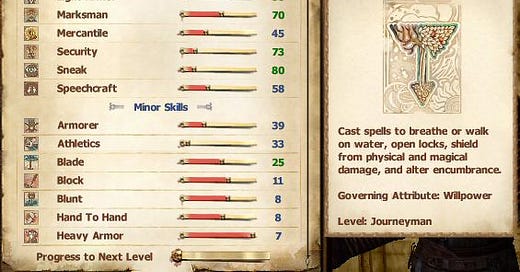Part of an Engineering Manager’s (EM) job description is helping their team grow their skills. Well at least it should be. To do this well, a Manager and Engineer should be on the same page for what they would like to improve on. As with many things in software engineering, you need alignment!
Getting alignment on people's strengths and weaknesses can be hard. These conversations require a level of comfort, introspection, and communication that can take time to build. However, waiting too long to have this discussion is an anti-pattern. You want to be aligned on growth targets at the start of a performance review period, not at the end of it.
Enter the The Engineering Skill Points Game, a tool I’ve been using here at Mixpanel to more quickly learn engineers' skills and desired growth. I’ve gotten positive feedback on the exercise, so decided to share it on our blog!
The Idea
Inspired by Role Playing Games (RPGs) such as Oblivion or Dungeons & Dragons, The Engineering Skill Points Game involves the IC creating a ‘skill distribution’ for themselves, representing both their skills today and their skills in an ideal future. This forces the IC and EM to have a conversation about what skills are important to the job, relative strengths and weaknesses, and future growth.
On top of that I like to think it is fun! Let’s get down to how it works.
The Engineering Skill Points Game
Setup - breaking the ice and setting the stage
What Are Engineering Skills? - Calibration on the different aspects of engineering
What Are Your Skill Levels? - Calibration on strengths and weaknesses
What’s Your Plan? - Calibration on goals
Setup
Before the exercise I ask a few setup questions to prime the conversation.
First, “What role would you like to be doing in 5 years?” I give some preset options: architect, pure IC, manager, another role in tech, or already retired. This opens up the career conversation and can frame what skills we will break down in the next phase of the exercise.
Second, “Do you view yourself as a generalist, or a specialist?” (or T Shaped). This gets them reflecting on where they’ve invested their time in their career so far.
Lastly, I check if they are familiar with RPGs and the idea of Skill Points. If they are not, I walk them through what they are. Then we’re ready to begin the larger exercise!
Phase 1 - What Are Engineering Skills?
Phase 1 of the exercise is about understanding the engineers opinion on fundamental skills. In the RPG equivalent these are things like Acrobatics, Perception, or Stealth. But in someone's Software Engineering career there is a wide range of possible answers. To help illustrate, I will show an example answer from an engineer here at Mixpanel (with their permission):
Engineering Skills:
Coding / Programming
Engineering Design
Project Roadmapping / Long Term Vision
Planning / Project Management
Technical Communication
Stakeholder Management
Now we understand what this individual thinks goes into software engineering. It is tempting as manager to pre-prepare a set of skills you think are fundamental to the job, but doing so will rob you of the insight into your engineer's perspective. Better to save any suggestions for after the IC has finished a first pass.
Keep in mind that this is simply a conversation tool. It is not meant to serve the same purposes as an Engineering Ladder, such as shaping the company's promotion paths (but as EM you should be keeping those in mind).
Phase 2 - What Are Your Skill Levels?
Phase 2 of the exercise is giving the IC some number of points to distribute amongst their skills in a way that represents who they are today. I usually give 3 * (number of skills) points, so they could put 3 in each category if they felt like they were perfectly balanced across all skill areas. Continuing our example, that worked out to 18 points spread like this:
Coding / Programming - 5
Engineering Design - 2
Project Roadmapping / Long Term Vision - 1
Planning / Project Management - 3
Technical Communication - 3
Stakeholder Management - 4
One thing I really love is that this intuitively frames lower skill point areas as deprioritized areas instead of inherent weaknesses!
Phase 3 - What's Your Plan?
The final phase is perhaps the most interesting: the IC has ~10 points that they can invest over the next 2 years. Where will they put them? Do they want to double down on their current strength, shore up a weakness, or perhaps create a new area of strength? Continuing the example, they chose to invest a lot in long term vision while also improving in other skills across the board:
Coding / Programming - 5
Engineering Design - 2 → 5
Project Roadmapping / Long Term Vision - 1 → 5
Planning / Project Management - 3 → 5
Technical Communication - 3 → 4
Stakeholder Management - 4
This phase is my favorite. It gives granular insight into an engineer's desired growth, giving a great starting point for what ideas to work together on, books to recommend, or other insights to discuss!
Try It Out!
I hope you found this exercise interesting! I encourage you to give this a go with your mentor or mentee to see if you find it helpful. If you’d like to chat with me about it feel free to reach out on LinkedIn or you can find me lurking on Rands Leadership Slack.




